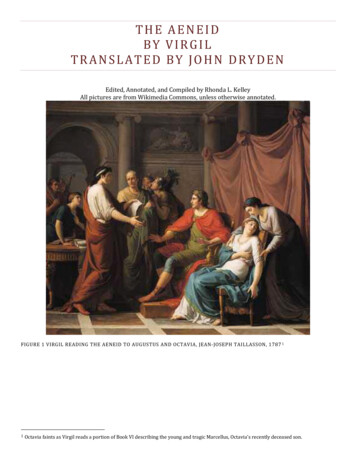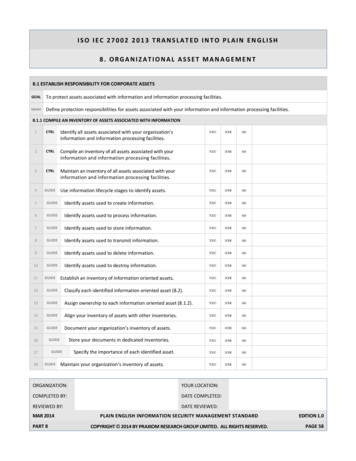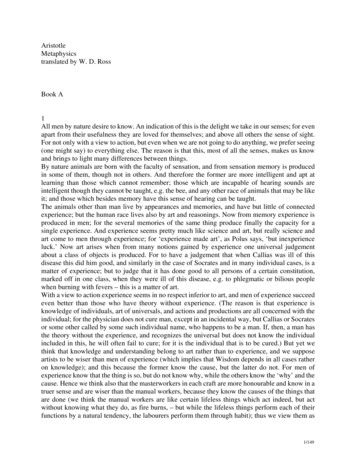
Transcription
THE AENEIDBY VIRGILTRANSLATED BY JOHN DRYDENEdited, Annotated, and Compiled by Rhonda L. KelleyAll pictures are from Wikimedia Commons, unless otherwise annotated.FIGURE 1 VIRGIL READING THE AENEID TO AUGUSTUS AND OCTAVIA, JEAN-JOSEPH TAILLASSON, 1787 11Octavia faints as Virgil reads a portion of Book VI describing the young and tragic Marcellus, Octavia’s recently deceased son.
TABLE OF CONTENTSTable of Contents . 2BOOK I: ARMS AND THE MAN . 3BOOK II: THE FALL OF TROY.22BOOK III: AENEAS’ WANDERINGS .44Summary . 44BOOK IV: THE PASSION OF DIDO . 47BOOK V: FUNERAL GAMES. 67Summary . 67BOOK VI: The Underworld.71BOOK VII: A BETROTHAL AND A DECLARATION OF WAR .95Summary .95BOOK VIII: EVANDER AND AENEAS’ NEW ARMOR . 97Summary and Excerpt .97Shield of Aeneas .98BOOK IX: Turnus Attacks . 102Summary and Excerpt . 102Nisus and Euryalus. 103BOOK X: War Rages On . 112Summary and Excerpts . 112The Youthful Pallas and Lausus . 113Death of Pallas. 113Death of Lausus . 115BOOK XI: The Trojans Advance . 117Summary . 117BOOK XII: Turnus Vs. Aeneas . 119SummAry and Excerpt . 119Aeneas Kills Turnus . 120
BOOK I: ARMS AND THE MANFIGURE 2 THE FEAST OF DIDO AND AENEAS, FRANCOIS DE TROY, 1704Arms, and the man I sing, 2 who, forc'd by fate,And haughty Juno's 3 unrelenting hate,Expell'd and exil'd, left the Trojan shore. 4Long labors, both by sea and land, he bore,And in the doubtful war, before he wonThe Latian5 realm, and built the destin'd town; 6His banish'd gods restor'd to rites divine,And settled sure succession in his line, 7From whence the race of Alban 8 fathers come,And the long glories of majestic Rome.O Muse! the causes and the crimes relate;Arma virumque cano (Latin), the famous first words of the Aeneid.Hera (Greek); Queen of the gods who hates the Trojans.4 At the Fall of Troy (1184 BC).5 Latium6 Rome7 Aeneas is the legendary ancestor of the Julio-Claudians, the clan to which Julius Caesar and Caesar Augustus belong.8 Alba Longa, an ancient Italian city from which legendary Roman founder Romulus came.23
What goddess was provok'd, and whence her hate;For what offense the Queen of Heav'n beganTo persecute so brave, so just a man;Involv'd his anxious life in endless cares,Expos'd to wants, and hurried into wars!Can heav'nly minds such high resentment show,Or exercise their spite in human woe?Against the Tiber's 9 mouth, but far away,An ancient town was seated on the sea;A Tyrian10 colony; the people madeStout for the war, and studious of their trade:Carthage the name; belov'd by Juno moreThan her own Argos, or the Samian shore.Here stood her chariot; here, if Heav'n were kind,The seat of awful empire she design'd.Yet she had heard an ancient rumor fly,(Long cited by the people of the sky,)That times to come should see the Trojan raceHer Carthage ruin, and her tow'rs deface; 11Nor thus confin'd, the yoke of sov'reign swayShould on the necks of all the nations lay.She ponder'd this, and fear'd it was in fate;Nor could forget the war she wag'd of late 12For conqu'ring Greece against the Trojan state.Besides, long causes working in her mind,And secret seeds of envy, lay behind;Deep graven in her heart the doom remain'dOf partial Paris, and her form disdain'd; 13The grace bestow'd on ravish'd Ganymed, 14Electra's glories, 15 and her injur'd bed.Each was a cause alone; and all combin'dTo kindle vengeance in her haughty mind.For this, far distant from the Latian coast 16She drove the remnants of the Trojan host;And sev'n long years th' unhappy wand'ring trainWere toss'd by storms, and scatter'd thro' the main.Such time, such toil, requir'd the Roman name,Such length of labor for so vast a frame.Now scarce the Trojan fleet, with sails and oars,Had left behind the fair Sicilian shores,Ent'ring with cheerful shouts the wat'ry reign,And plowing frothy furrows in the main;When, lab'ring still with endless discontent,The Queen of Heav'n did thus her fury vent:"Then am I vanquish'd? must I yield?" said she,"And must the Trojans reign in Italy?So Fate will have it, and Jove adds his force;The Italian River on whose eastern bank Rome was founded in 753 BC.A Phoenician city; ruled by Dido’s brother Pygmalion. The Tyrians established Carthage to flee Pygmalion’s tyranny.11 The Romans (descended from the Trojans) would raze Carthage at the end of the 3rd Punic War (146 BC).12 The Trojan War13 See The Judgement of Paris; Paris chose Venus over Juno and Minerva in a high stakes beauty contest.14 A young (as in, child) Trojan prince, kidnapped and ravished by Jove. Unlike Jove’s other rape victims, Ganymede was kept by the king ofthe gods as his personal cup-bearer.15 Electra is not mentioned in the Latin text.16 Latium; the region in which Rome was eventually founded(and so Aeneas’ goal) and home to the Latins, an indigenous tribe.910
Nor can my pow'r divert their happy course.Could angry Pallas, 17 with revengeful spleen,The Grecian navy burn, and drown the men?She, for the fault of one offending foe, 18The bolts of Jove himself presum'd to throw:With whirlwinds from beneath she toss'd the ship,And bare expos'd the bosom of the deep;Then, as an eagle gripes the trembling game,The wretch, yet hissing with her father's flame,She strongly seiz'd, and with a burning woundTransfix'd, and naked, on a rock she bound.But I, who walk in awful state above,The majesty of heav'n, the sister wife of Jove,For length of years my fruitless force employAgainst the thin remains of ruin'd Troy!What nations now to Juno's pow'r will pray,Or off'rings on my slighted altars lay?"Thus rag'd the goddess;34-80 As the Trojans are sailing from Sicily on the last stage of their voyage to Italy Juno intervenes to stop them. Shegoes to Aeolus, king of the winds, and urges him to stir up a storm and wreck the Trojans. He agrees to do so.81-123 Aeolus causes the storm to begin; Aeneas is panic-stricken, and prays for death. The ships are buffeted, andthat of Orontes sinks.124-156 Neptune intervenes, angrily rebukes the winds, and calms the storm.The weary Trojans ply their shatter'd oarsTo nearest land, and make the Libyan shores. 19Within a long recess there lies a bay:An island shades it from the rolling sea,And forms a port secure for ships to ride;Broke by the jutting land, on either side,In double streams the briny waters glide.Betwixt two rows of rocks a sylvan scene 20Appears above, and groves for ever green:A grot is form'd beneath, with mossy seats,To rest the Nereids, 21 and exclude the heats.Down thro' the crannies of the living wallsThe crystal streams descend in murm'ring falls:No haulsers need to bind the vessels here,Nor bearded anchors; for no storms they fear.Sev'n ships within this happy harbor meet,The thin remainders of the scatter'd fleet.The Trojans, worn with toils, and spent with woes,Leap on the welcome land, and seek their wish'd repose.First, good Achates 22, with repeated strokesOf clashing flints, their hidden fire provokes:Pallas Athena, aka Minerva, is the other goddess rejected by Paris in the beauty contest; Minerva, thus, hates the Trojans as much as Juno.Ajax son of Oileus, aka Ajax the Lesser, was a valiant and swift-footed Greek warrior; Minerva hated him and thwarted him in a footraceagainst Odysseus at Patroclus’ funeral games; later the goddess wrecked his ship; showing his defiance for all of the gods, Ajax was killed byPoseidon who had previously tried to save him.19 Carthage.20 Sylvan pristine forest21Sea nymphs22 Aeneas’ steadfast companion.1718
Short flame succeeds; a bed of wither'd leavesThe dying sparkles in their fall receives:Caught into life, in fiery fumes they rise,And, fed with stronger food, invade the skies.The Trojans, dropping wet, or stand aroundThe cheerful blaze, or lie along the ground:Some dry their corn, infected with the brine,Then grind with marbles, and prepare to dine.Aeneas climbs the mountain's airy brow,And takes a prospect of the seas below,If Capys thence, or Antheus he could spy,Or see the streamers of Caicus fly. 23No vessels were in view; but, on the plain,Three beamy stags command a lordly trainOf branching heads: the more ignoble throngAttend their stately steps, and slowly graze along.He stood; and, while secure they fed below,He took the quiver and the trusty bowAchates 24 us'd to bear: the leaders firstHe laid along, and then the vulgar pierc'd;Nor ceas'd his arrows, till the shady plainSev'n mighty bodies with their blood distain.For the sev'n ships he made an equal share,And to the port return'd, triumphant from the war. 25The jars of gen'rous wine (Acestes' gift,When his Trinacrian26 shores the navy left)He set abroach, and for the feast prepar'd,In equal portions with the ven'son shar'd.Thus while he dealt it round, the pious chiefWith cheerful words allay'd the common grief:"Endure, and conquer! Jove will soon disposeTo future good our past and present woes.With me, the rocks of Scylla 27 you have tried;Th' inhuman Cyclops 28 and his den defied.What greater ills hereafter can you bear?Resume your courage and dismiss your care,An hour will come, with pleasure to relateYour sorrows past, as benefits of Fate.Thro' various hazards and events, we moveTo Latium and the realms foredoom'd by Jove.Call'd to the seat (the promise of the skies)Where Trojan kingdoms once again may rise,Endure the hardships of your present state;Live, and reserve yourselves for better fate."These words he spoke, but spoke not from his heart;His outward smiles conceal'd his inward smart.The jolly crew, unmindful of the past,The quarry share, their plenteous dinner haste.Capys, Antheus, and Caicus are Aeneas friends and ship-captains. Aeneas is searching for any of sign of his lost ships.Dryden, here, refers to the bow as “trusty,” but it is clear in the Latin that Virgil applies the adjective fidus (Lat., “faithful”) to Achates forwhom fidus is an epithet.25 i.e. the hunt26 Sicilian27 A sea monster; woman above and snarling dog heads below; part of the monstrous duo Scylla and Charybdis.28 Polyphemus.2324
Some strip the skin; some portion out the spoil;The limbs, yet trembling, in the caldrons boil;Some on the fire the reeking entrails broil.Stretch'd on the grassy turf, at ease they dine,Restore their strength with meat, and cheer their souls with wine.Their hunger thus appeas'd, their care attendsThe doubtful fortune of their absent friends:Alternate hopes and fears their minds possess,Whether to deem 'em dead, or in distress.Above the rest, Aeneas mourns the fateOf brave Orontes, and th' uncertain stateOf Gyas, Lycus, and of Amycus.The day, but not their sorrows, ended thus.When, from aloft, almighty Jove surveysEarth, air, and shores, and navigable seas,At length on Libyan realms he fix'd his eyesWhom, pond'ring thus on human miseries,When Venus 29 saw, she with a lowly look,Not free from tears, her heav'nly sire bespoke:"O King of Gods and Men! whose awful handDisperses thunder on the seas and land,Disposing all with absolute command;How could my pious son thy pow'r incense?Or what, alas! is vanish'd Troy's offense?Our hope of Italy not only lost,On various seas by various tempests toss'd,But shut from ev'ry shore, and barr'd from ev'ry coast.You promis'd once, a progeny divineOf Romans, rising from the Trojan line,In after times should hold the world in awe,And to the land and ocean give the law.How is your doom 30 revers'd, which eas'd my careWhen Troy was ruin'd in that cruel war?Then fates to fates I could oppose; but now,When Fortune still pursues her former blow,What can I hope? What worse can still succeed?What end of labors has your will decreed?Antenor, from the midst of Grecian hosts,Could pass secure, and pierce th' Illyrian coasts,Where, rolling down the steep, Timavus ravesAnd thro' nine channels disembogues his waves.At length he founded Padua's happy seat,And gave his Trojans a secure retreat;There fix'd their arms, and there renew'd their name,And there in quiet rules, and crown'd with fame.But we, descended from your sacred line,Entitled to your heav'n and rites divine,Are banish'd earth; and, for the wrath of one,Remov'd from Latium and the promis'd throne.Are these our scepters? these our due rewards?And is it thus that Jove his plighted faith regards?"To whom the Father of th' immortal race, 312930Goddess of love and Aeneas’ mother.Judgment.
Smiling with that serene indulgent face,With which he drives the clouds and clears the skies,First gave a holy kiss; then thus replies:"Daughter, dismiss thy fears; to thy desireThe fates of thine are fix'd, and stand entire.Thou shalt behold thy wish'd Lavinian walls;And, ripe for heav'n, when fate Aeneas calls,Then shalt thou bear him up, sublime, to me: 32No councils have revers'd my firm decree.And, lest new fears disturb thy happy state,Know, I have search'd the mystic rolls of Fate:Thy son (nor is th' appointed season far)In Italy shall wage successful war,Shall tame fierce nations in the bloody field,And sov'reign laws impose, and cities build,Till, after ev'ry foe subdued, the sunThrice thro' the signs his annual race shall run:This is his time prefix'd. Ascanius then,Now call'd Iulus, shall begin his reign.He thirty rolling years the crown shall wear,Then from Lavinium shall the seat transfer,And, with hard labor, Alba Longa build.The throne with his succession shall be fill'dThree hundred circuits more: then shall be seenIlia the fair, 33 a priestess 34 and a queen,Who, full of Mars, in time, with kindly throes,Shall at a birth two goodly boys disclose. 35The royal babes a tawny wolf shall drain:Then Romulus his grandsire's throne shall gain,Of martial tow'rs the founder shall become,The people Romans call, the city Rome.To them no bounds of empire I assign,Nor term of years to their immortal line.Ev'n haughty Juno, who, with endless broils,Earth, seas, and heav'n, and Jove himself turmoils;At length aton'd, her friendly pow'r shall join,To cherish and advance the Trojan line.The subject world shall Rome's dominion own,And, prostrate, shall adore the nation of the gown. 36An age is ripening in revolving fateWhen Troy shall overturn the Grecian state,And sweet revenge her conqu'ring sons shall call,To crush the people that conspir'd her fall.Then Caesar 37 from the Julian 38 stock shall rise,Whose empire ocean, and whose fame the skiesAlone shall bound; whom, fraught with eastern spoils,Our heav'n, the just reward of human toils,Jove, father and king of the Oympian godsJove promises Aeneas will be taken to live with the gods on Olymus when he dies.33 Rhea Silva34 A Vestal Virgin35 The twins Romulus and Remus36 Togatam (Lat., “toga”)37 Julius Caesar38 The Julio-Claudians claimed descent from both Venus (through Aeneas) and Mars (through Romulus), as Jove has just neatly outlined forus.3132
Securely shall repay with rites divine;And incense shall ascend before his sacred shrine. 39Then dire debate and impious war shall cease,And the stern age be soften'd into peace: 40Then banish'd Faith shall once again return,And Vestal fires in hallow'd temples burn;And Remus with Quirinus shall sustainThe righteous laws, and fraud and force restrain.Janus 41 himself before his fane shall wait,And keep the dreadful issues of his gate,With bolts and iron bars: within remainsImprison'd Fury, bound in brazen chains;High on a trophy rais'd, of useless arms,He sits, and threats the world with vain alarms."He said, and sent Cyllenius 42 with commandTo free the ports, and ope the Punic land 43To Trojan guests; lest, ignorant of fate,The queen44 might force them from her town and state.Down from the steep of heav'n Cyllenius flies,And cleaves with all his wings the yielding skies.Soon on the Libyan shore descends the god,Performs his message, and displays his rod:The surly murmurs of the people cease;And, as the fates requir'd, they give the peace:The queen herself suspends the rigid laws,The Trojans pities, and protects their cause. 45Meantime, in shades of night Aeneas lies:Care seiz'd his soul, and sleep forsook his eyes.But, when the sun restor'd the cheerful day,He rose, the coast and country to survey,Anxious and eager to discover more.It look'd a wild uncultivated shore;But, whether humankind, or beasts alonePossess'd the new-found region, was unknown.Beneath a ledge of rocks his fleet he hides:Tall trees surround the mountain's shady sides;The bending brow above a safe retreat provides.Arm'd with two pointed darts, he leaves his friends,And true Achates on his steps attends.Lo! in the deep recesses of the wood,Before his eyes his goddess mother stood:A huntress in her habit and her mien;Her dress a maid, her air confess'd a queen. 46Bare were her knees, and knots her garments bind;Loose was her hair, and wanton'd in the wind;Julius Caesar was deified (named Divus Julius) by the Senate in 41 BC (3 years after his death); Octavian (Augustus) assumed the title Divifilius (son of god) ten years later.40 The Pax Augusta or Pax Romana (the Augustan Peace or the Roman Peace) was one of Augustus’ touted accomplishments.41 The doors of the Temple of Janus are closed when Rome is at peace (a rare occasion).42 Mercury, messenger god, son of Jove.43 Carthage44 Dido or Elissa45 These Trojans are from those ships lost to Aeneas; they in turn believe him and his seven ships to be lost.46 Venus tries to disguise herself as a Tyrian huntress, but cannot pull it off. Compare this disguise failure to a similar scene in the Iliad (BookIII), when the goddess of love “disguised” herself as an old woman, but failed because her vanity would not allow her to diminish her beauty.39
Her hand sustain'd a bow; her quiver hung behind.She seem'd a virgin of the Spartan blood:With such array Harpalyce bestrodeHer Thracian courser and outstripp'd the rapid flood."Ho, strangers! have you lately seen," she said,"One of my sisters, like myself array'd,Who cross'd the lawn, or in the forest stray'd?A painted quiver at her back she bore;Varied with spots, a lynx's hide she wore;And at full cry pursued the tusky boar."Thus Venus: thus her son replied again:"None of your sisters have we heard or seen,O virgin! or what other name you bearAbove that style- O more than mortal fair!Your voice and mien celestial birth betray!If, as you seem, the sister of the day,Or one at least of chaste Diana's train,Let not an humble suppliant sue in vain;But tell a stranger, long in tempests toss'd,What earth we tread, and who commands the coast?Then on your name shall wretched mortals call,And offer'd victims at your altars fall." 47"I dare not," she replied, "assume the nameOf goddess, or celestial honors claim:For Tyrian virgins bows and quivers bear,And purple buskins o'er their ankles wear.Know, gentle youth, in Libyan lands you areA people rude in peace, and rough in war.The rising city, which from far you see,Is Carthage, and a Tyrian colony.Phoenician Dido rules the growing state,Who fled from Tyre, to shun her brother's hate. 48Great were her wrongs, her story full of fate;Which I will sum in short. Sichaeus, 49 knownFor wealth, and brother to the Punic throne,Possess'd fair Dido's bed; and either heartAt once was wounded with an equal dart.Her father gave her, yet a spotless maid;Pygmalion then the Tyrian scepter sway'd:One who condemn'd divine and human laws.Then strife ensued, and cursed gold the cause.The monarch, blinded with desire of wealth,With steel invades his brother's 50 life by stealth;Before the sacred altar made him bleed,And long from her conceal'd the cruel deed.Some tale, some new pretense, he daily coin'd,To soothe his sister, and delude her mind.At length, in dead of night, the ghost 51 appearsOf her unhappy lord: the specter stares,And, with erected eyes, his bloody bosom bares.Aeneas knows she is a goddess, but not which one.Pygmailon, King of Tyre.49 Dido’s first husband.50 Brother-in-law51 One of many ghosts and spirits that appear in the Aeneid4748
The cruel altars and his fate he tells,And the dire secret of his house reveals,Then warns the widow, with her household gods,To seek a refuge in remote abodes.Last, to support her in so long a way,He shows her where his hidden treasure lay.Admonish'd thus, and seiz'd with mortal fright,The queen provides companions of her flight:They meet, and all combine to leave the state,Who hate the tyrant, or who fear his hate.They seize a fleet, which ready rigg'd they find;Nor is Pygmalion's treasure left behind.The vessels, heavy laden, put to seaWith prosp'rous winds; a woman leads the way.I know not, if by stress of weather driv'n,Or was their fatal course dispos'd by Heav'n;At last they landed, where from far your eyesMay view the turrets of new Carthage rise;There bought a space of ground, which (Byrsa call'd,From the bull's hide) they first inclos'd, and wall'd.But whence are you? what country claims your birth?What seek you, strangers, on our Libyan earth?"To whom, with sorrow streaming from his eyes,And deeply sighing, thus her son replies:"Could you with patience hear, or I relate,O nymph, the tedious annals of our fate!Thro' such a train of woes if I should run,The day would sooner than the tale be done!From ancient Troy, by force expell'd, we cameIf you by chance have heard the Trojan name.On various seas by various tempests toss'd,At length we landed on your Libyan coast.The good Aeneas am I call'd- a name,While Fortune favor'd, not unknown to fame.My household gods, companions of my woes,With pious care I rescued from our foes.To fruitful Italy my course was bent;And from the King of Heav'n is my descent.With twice ten sail I cross'd the Phrygian sea;Fate and my mother goddess led my way.Scarce sev'n, the thin remainders of my fleet,From storms preserv'd, within your harbor meet.Myself distress'd, an exile, and unknown,Debarr'd from Europe, and from Asia thrown,In Libyan desarts wander thus alone."His tender parent could no longer bear;But, interposing, sought to soothe his care."Whoe'er you are- not unbelov'd by Heav'n,Since on our friendly shore your ships are driv'nHave courage: to the gods permit the rest,And to the queen expose your just request.Now take this earnest of success, for more:Your scatter'd fleet is join'd upon the shore; 52The winds are chang'd, your friends from danger free;52Venus tells Aeneas his “lost” fleet has already been received by Dido.
Or I renounce my skill in augury.Twelve swans behold in beauteous order move,And stoop with closing pinions from above;Whom late the bird of Jove had driv'n along,And thro' the clouds pursued the scatt'ring throng:Now, all united in a goodly team,They skim the ground, and seek the quiet stream.As they, with joy returning, clap their wings,And ride the circuit of the skies in rings;Not otherwise your ships, and ev'ry friend,Already hold the port, or with swift sails descend.No more advice is needful; but pursueThe path before you, and the town in view."Thus having said, she turn'd, and made appearHer neck refulgent, and dishevel'd hair,Which, flowing from her shoulders, reach'd the ground.And widely spread ambrosial scents around:In length of train descends her sweeping gown;And, by her graceful walk, the Queen of Love is known.The prince pursued the parting deityWith words like these: "Ah! whither do you fly?Unkind and cruel! to deceive your sonIn borrow'd shapes, and his embrace to shun;Never to bless my sight, but thus unknown;And still to speak in accents not your own."Against the goddess these complaints he made,But took the path, and her commands obey'd.They march, obscure; for Venus kindly shroudsWith mists their persons, and involves in clouds,That, thus unseen, their passage none might stay,Or force to tell the causes of their way.This part perform'd, the goddess flies sublimeTo visit Paphos and her native clime;Where garlands, ever green and ever fair,With vows are offer'd, and with solemn pray'r:A hundred altars in her temple smoke;A thousand bleeding hearts her pow'r invoke.They53 climb the next ascent, and, looking down,Now at a nearer distance view the town.The prince with wonder sees the stately tow'rs,Which late were huts and shepherds' homely bow'rs,The gates and streets; and hears, from ev'ry part,The noise and busy concourse of the mart.The toiling Tyrians on each other callTo ply their labor: some extend the wall;Some build the citadel; the brawny throngOr dig, or push unwieldly stones along.Some for their dwellings choose a spot of ground,Which, first design'd, with ditches they surround.Some laws ordain; and some attend the choiceOf holy senates, and elect by voice.Here some design a mole, 54 while others there5354Achates and Aeneasharbor
Lay deep foundations for a theater;From marble quarries mighty columns hew,For ornaments of scenes, and future view.Such is their toil, and such their busy pains,As exercise the bees in flow'ry plains,When winter past, and summer scarce begun,Invites them forth to labor in the sun;Some lead their youth abroad, while some condenseTheir liquid store, and some in cells dispense;Some at the gate stand ready to receiveThe golden burthen, and their friends relieve;All with united force, combine to driveThe lazy drones from the laborious hive:With envy stung, they view each other's deeds;The fragrant work with dili
THE AENEID BY VIRGIL . TRANSLATED BY JOHN DRYDEN . Edited, Annotated, and Compiled by Rhonda L. Kelley . All pictures










